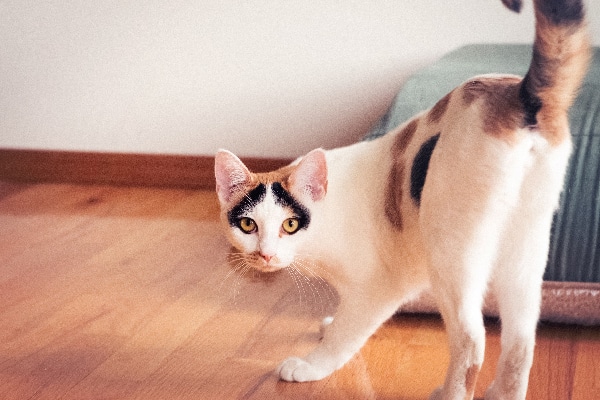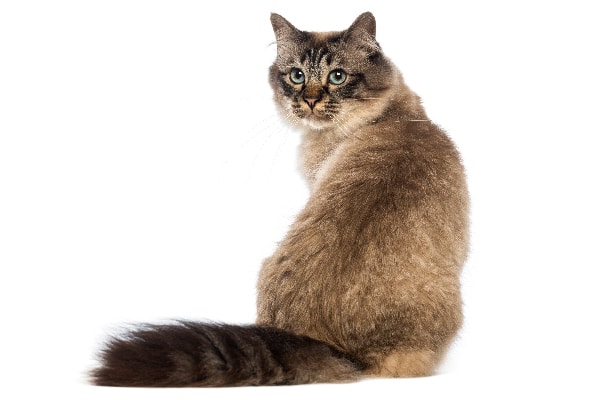The post Is Your Cat Chasing His Tail? Should You Ever Worry About It? by catedit appeared first on Catster. Copying over entire articles infringes on copyright laws. You may not be aware of it, but all of these articles were assigned, contracted and paid for, so they aren't considered public domain. However, we appreciate that you like the article and would love it if you continued sharing just the first paragraph of an article, then linking out to the rest of the piece on Catster.com.
I’ve seen plenty of dogs chasing their tails before, so I was caught off guard when I saw a cat chasing his tail. My friend’s cat, Jax, started to chase his own tail, and it made me wonder if Jax was copying the behavior of my friend’s Golden Retriever.
Later, I found out that Jax wasn’t being a copycat. Unfortunately, he had an infection on his tail. So, is it ever a problem when you see a cat chasing his tail? What should you do about a cat chasing his tail? Let’s take a look.
Related: 5 Cool Cat Tail Facts

Is a cat chasing his tail normal — or is something serious at play? Photography © debibishop | iStock / Getty Images Plus.
First, is it normal to see a cat chasing his tail?
Some cats, like dogs, do chase their tails just for fun. “Some cats will chase their tails for entertainment, but it is less common in cats than dogs,” says Dr. Sasha Gibbons of Just Cats Veterinary Hospital in Stamford, Connecticut.
But, sometimes, a cat chasing his tail means a little something more in cat tail language. And, unfortunately, there are times when a cat chasing his tail signals the opposite of fun.
“Cats can also chase their tails for a number of medical reasons,” Dr. Gibbons explains. “Cats will chase their tails if there is an infection and the tail is uncomfortable, or if it is itchy from allergies. Cats can also have a condition called hyperesthesia syndrome, which is caused by overactive nerve endings, and cats feel a tingly sensation on the tail.”
Stud tail, which is a cat skin condition, is another issue that might be at play and calls for vet attention.
It is important to know your cat’s normal body and tail language to make sure he is not acting out because of a medical reason.
What if a cat is chasing his tail — and biting it in the process?
Make sure you have a plan of action if you notice a cat chasing his tail — and biting it! “Cat tails can get infected very easily, and it can be hard to resolve a tail infection, so any injury to the tail (self-inflicted) or from another cat, should be evaluated by a veterinarian,” says Dr. Gibbons.

Can you stop a cat from chasing his tail? Photography © GlobalP | iStock / Getty Images Plus.
How do you a stop a cat from chasing his tail?
If your cat is chasing his tail and you suspect infection, hyperesthesia, stud tail or any injury, get your cat to the vet ASAP.
But, should you ever be concerned about a cat chasing his tail playfully?
“If a cat is simply chasing his tail, but not biting or doing damage to the tail, it may be from boredom,” Dr. Gibbons explains. “If an owner witnesses their cat doing it, they can try to redirect the cat to chase a toy on a string or laser pointer.”
If you’re worried that your cat is bored because you’re out of the house for long periods of time, Dr. Gibbons suggests using interactive toys such as Frolicat or Panic Mouse. This will help your cat focus more on the toys and less on playing with his tail.
What about cats who swat their cat siblings’ tails?
Sometimes, a cat chasing his own tail isn’t the issue — it’s a cat chasing another cat’s tail! It is important to recognize a cat’s body language when this is happening. “Attacking another cat’s tail can be playful or aggressive,” says Dr. Gibbons. “It all depends on the attacker’s body language during the act — and the extent of damage done to the victim.”
Separate cats who are behaving aggressively toward each other. Even if your cat is chasing or swatting at another cats’ tail playfully, redirect the cats’ attention to interactive toys.
The bottom line on a cat chasing his tail
Remember that a cat chasing his tail isn’t always playful or fun. Seek vet care any time your cat is causing damage to his tail or you suspect that he’s chasing his tail out of discomfort. If the issue seems behavioral and not medical, search for a veterinary behaviorist in your area by checking out the American College of Veterinary Behaviorists (ACVB). These experts will evaluate your cat’s specific situation and help you decide what to do next.
Tell us: Does your cat chase his tail? Is your cat chasing his tail for fun — or has your cat ever chased his tail due to a more serious issue?
Thumbnail: Photography © GlobalP | iStock / Getty Images Plus.
Read Next: Cat Tail Wagging: The Meaning of Your Cat’s Different Tail Wags
The post Is Your Cat Chasing His Tail? Should You Ever Worry About It? by catedit appeared first on Catster. Copying over entire articles infringes on copyright laws. You may not be aware of it, but all of these articles were assigned, contracted and paid for, so they aren't considered public domain. However, we appreciate that you like the article and would love it if you continued sharing just the first paragraph of an article, then linking out to the rest of the piece on Catster.com.
catedit